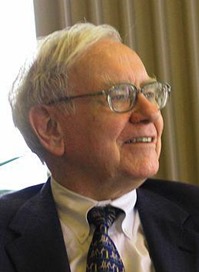Get ePub or Kindle file of this
 Ego can be healthy in philanthropy. LibraryCity made that point some months ago in calling for a national digital library endowment. A Bill and Melinda Gates Collection in computer science (with librarians, not marketers or PR flacks, in charge)? Sure. And the same for a Warren Buffett Collection in an area like finance.
Ego can be healthy in philanthropy. LibraryCity made that point some months ago in calling for a national digital library endowment. A Bill and Melinda Gates Collection in computer science (with librarians, not marketers or PR flacks, in charge)? Sure. And the same for a Warren Buffett Collection in an area like finance.
Now here’s another ego angle. At one Los Angeles school library—and maybe others—children can’t read a Buffett biography. Why? The kids’ school library, like many others in L.A., has shut down for want of funds for staffing. If a national digital library endowment existed, more money would be available not just for e-books and other items but also for school and juvenile librarians and family literacy experts to encourage the content’s absorption. The endowment could help finance Internet-era professional development as well as hiring. Skilled librarians can help students learn to distinguish malarkey from truth. Warren Buffett’s B.S.-detector is no small reason why he’s worth around $59 billion. Furthermore, when Buffett himself was young, he loved to read finance-related books. Hello, L.A.? Get the connections?
Significantly, an L.A. Times article on the school library mess there noted that without trained staffers, books in school libraries can go AWOL. By contrast, digital books self-expire without human intervention. Imagine all the money saved, as well the chance for library staffers to focus less on the mechanics of librarianship and more on helping kids discover new titles and learn the basics of research.
$100 million in books beyond students’ regular reach
Meanwhile the Times reports: “About half of the 600 elementary and middle school libraries” in the L.A. Unified School District are “without librarians or aides, denying tens of thousands of students regular access to nearly $100 million worth of books, according to district data.” This despite the billion dollars being spent on iPads! Just how good are the machines without the right people around to help the children use them to find information? Overworked teachers by themselves can do only so much. Studies have told how school librarians can boost K-12 students’ academic achievement, and recreational reading can do likewise.
A national digital library endowment would not solve all the fiscal challenges of school and public libraries or turn every student into a Rhodes Scholar, but it would easily justify itself. As Nebraska librarian Michael Sauers of the Travelin’ Librarian blog has noted, Warren Buffett “could find the resources.” No need to do the job single-handedly, of course. Together the 400 richest people in the U.S. are worth more than $2 trillion, according to Forbes, and total public library spending on content in 2010 was a mere $1.3 billion.
I applaud Bill Gates’s interest in global philanthropy. But he should be doing much more at home; and Warren Buffett, his friend and philanthropic partner, ideally will encourage him. Think workforce quality, guys. Unless U.S. business intends to export even more American jobs than it has already, a national digital library endowment could be highly cost effective for the super rich. Gates and Buffett both have been outspoken against the inequalities of the U.S. tax system. Now it’s time for sensitivity, too, in a crucial area like libraries, where, just as in our schools, the “savage inequalities” live on. The digital library issue is really an education and jobs issue in disguise.
A project for others if Gates won’t act
If Gates isn’t interested, then Buffett and his people or others can team up with librarians and public officials to fill in the gap and help get the endowment underway. I myself prefer a public endowment for maximum transparency and responsiveness. But a private effort would be better than none and could lead to a government agency later on, with the kinks worked out and the usefulness of the endeavor demonstrated to the taxpayers. Public money for the endowment could come in a serious way when Washington was less austerity-oriented.
For now, consider the advantages of a national approach (with separate but intertwined public and academic systems financed in part by the national endowment). The investment portfolios of endowments and foundations for America’s public and presidential libraries are worth a total of several billion, not that much in the grand scheme of things. And a billion is associated just with the New York Public Library. Lest N.Y.P.L. worry, however, this needn’t be a zero-sum game at all—I’d actually love to see the New York system and even elite Ivy League libraries get more resources than now. The money is out there, and it will come if librarians and their friends can think sufficiently big and act. $10 to $20 billion within the first five years would be a nice start, and still more could come later, especially in keeping with the spirit of the Gates-Buffett Giving Pledge.
Related: LibraryCity’s original national digital library endowment proposal, a detailed FAQ, a Baltimore Sun op-ed summing up the concept, and more on the kinds of activities that the endowment would help make possible at the local level. Also see the personal thoughts of Jim Duncan, executive director of the Colorado Library Consortium—not that far from Buffett’s Nebraska.
Similar Posts:
- Gates Global Libraries program is winding down: Time for a national digital library endowment to fill the vacuum
- National digital library endowment plan featured in Education Week
- In Warren Buffett’s own backyard: Underfunded Omaha libraries. National digital library endowment, anyone?
- LibraryCity’s national digital library endowment proposal makes the Chronicle of Philanthropy
- Baltimore Sun op-ed on ‘Books and billionaires’—LibraryCity’s proposal for a national digital library endowment